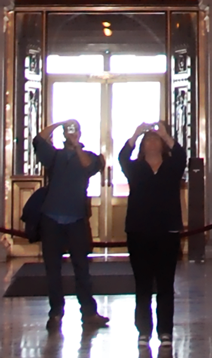
Greene, who was no stranger to Hollywood movies, thought the original ending
of "The Third Man" was too bleak for most audiences and wanted to change
it....
Well, no-- it wasn't the "original" ending: [spoiler] in
the novella he wrote as a first draft, he actually had Anna walk off, after
Lime's funeral, with Martins. [end of spoiler] It
was director Carol Reed and--shockingly-- the producer, David O. Selznick--
yes, the American Hollywood producer-- who insisted there should be no
compromise, because it was "right", artistically, because it was inevitable,
because the romantic ending would have been completely contrary to the
spirit of the story.
It is very hard to imagine otherwise. It was an uncharacteristically
cheesy idea of Greene's, and a brilliant realization by Reed and Selznick.
And I am convinced it is one of the main reasons "The Third Man" is regarded
so highly more than fifty years after it was made. The romantic ending
might have provided a moment of transient gratification-- but it would have
trivialized the rest of the film.
Considering all the indignities Hollywood has rendered upon good stories
over the years, that is amazing.
test
It's 1948. Postwar
Vienna is suffering shortages of everything, including medicine. It is
administered by a cooperative security force comprised of British, French,
American, and Russian soldiers. In a unique arrangement, a
representative of each country takes part in each routine patrol, even if
they can't speak each others' language.
The city is in ruins. The
people, demoralized, desperate.
Holly Martins
is an American writer of pulp westerns. He gets a message from an old
school chum, Harry Lime, to come visit him in Vienna. Sounds like an
adventure-- old times! But he arrives just ten minutes after Lime's
body has been carted away to be buried, after a car accident. Instead
of a happy reunion, he attends a somber funeral, along with a very small
number of Lime's friends. And a young woman, Anna, who walks away quickly
when the service is over.
Martins is clearly already infatuated with her and later catches up with her at the theatre
where she performs in sad, dispirited, period comedies. Perhaps the most
depressing moment of the film-- the actresses, in sumptuous costumes,
smiling and cavorting on stage, in some pathetic effort to recapture
something magical from a hopelessly distant past-- and the audience half-heartedly laughing.
After the play, she offers him a cup
of tea, but it is clear that she is in no mood for sentimental
reminiscences.
MARTINS
You were in
love with him, weren't you?
ANNA
I don't know. How can you know a
thing like
that afterwards? I don't
know anything
any more.
Well, damn right it's written by Graham
Greene. Martin's line is freighted with a misguided nostalgia for Lime
(we come to understand, even if Martins doesn't, that Lime used him) and
Anna's line is freighted with bitter disillusionment.
Holly is one of the earliest incarnations of
George W. Bush, blundering into complex situations which he can't remotely
understand but determined, nonetheless, to do something about them, and, in
the process, causing mayhem and suffering to all those around him.
He's the ugly American, the bumbling fool who thinks his native wit will
triumph over sophistication and cunning.
Anna
wants nothing to do with him. She just wants time to go by.
She's filled with fatalism,
resignation, and emotional fatigue.
You begin to understand how
war saps away hope and passion. And you begin to understand the
complex, disturbing attraction of Lime. And it is a wonderful tribute
to Greene that he resists the temptation to imbue Anna with some kind of
special nobility: it is clear she doesn't care about the victims of Lime's
black market activities-- she only wants him back. Because he was the
only thing in her bleak life that made her laugh.
You don't even get to anesthetize yourself with this
illusory "true love"-- she doesn't know. She doesn't know how you
would even know something like that "afterwards"
[spoiler] Then there is the astonishing last scene. The camera stands distant, at the end
of a long laneway leading away from the cemetery. Martins, the fool, prevails upon
Major Calloway to let him off. Calloway, reluctantly, stops the jeep
and lets him out. He stands there waiting for Anna to catch up to him. The
camera watches impassively as Anna slowly approaches Martins... then walks right
past
him as if he doesn't even exist. Martins doesn't move. We fully understand that he is being forced into a
tremendously painful realization, and all he can do is stand there and watch her
walk away.
All Contents Copyright
© Bill Van Dyk
2009 All Rights Reserved
Font: Verdana


